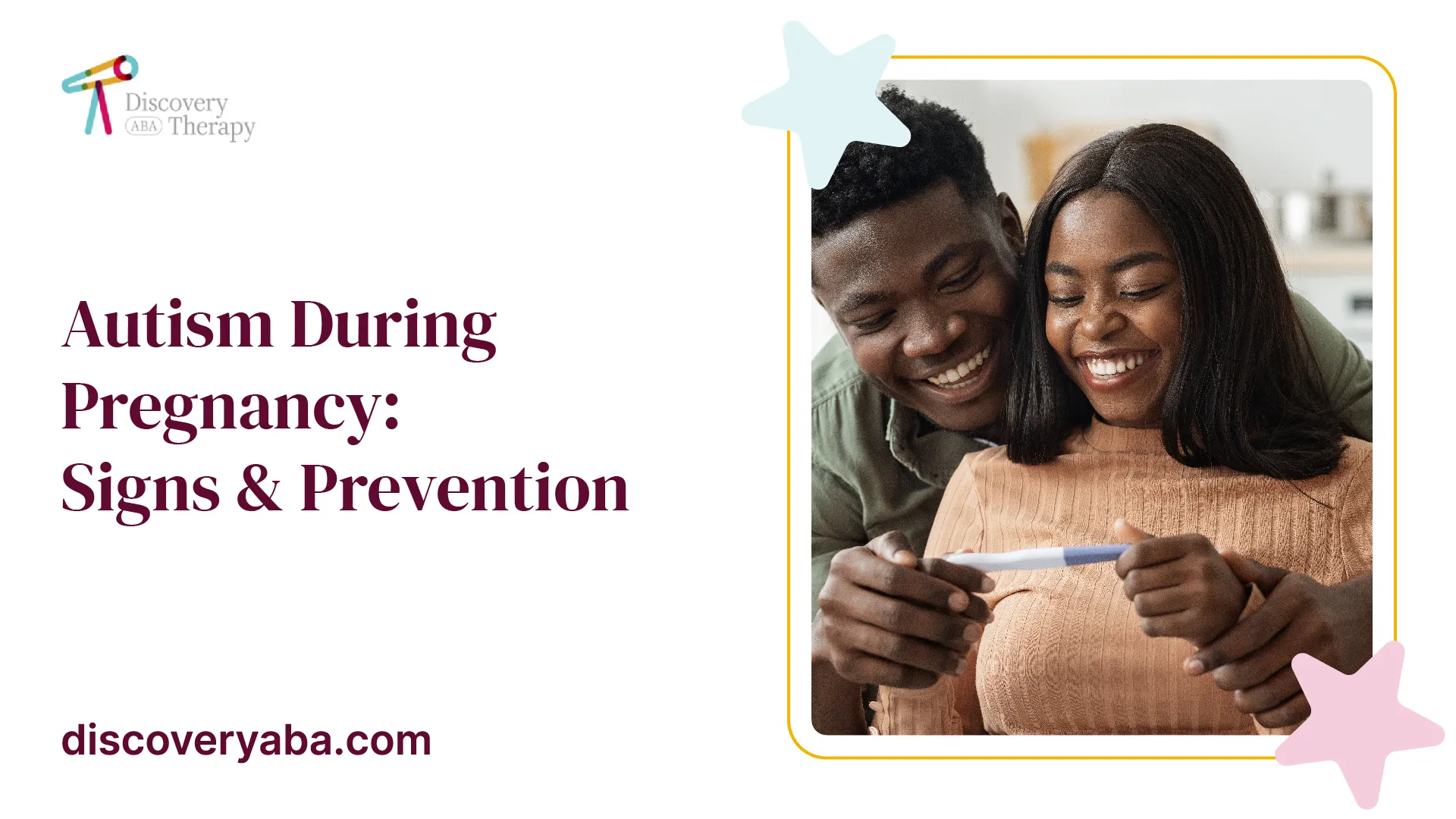Autism During Pregnancy: Signs & Prevention
In this guide, we will explore the relationship between autism and pregnancy, including risk factors, signs and symptoms, and treatment options.

Autism During Pregnancy
Autism is a complex neurological disorder that affects communication, social interaction, and behavior. While the exact causes of autism are still unknown, research suggests that both genetic and environmental factors play a role.

Risk Factors
There are several risk factors that have been associated with an increased likelihood of having a child with autism. These include:
- Advanced maternal age: Women who are over 35 years old when they give birth are at a higher risk of having a child with autism.
- Genetics: Autism tends to run in families, so if you have a family member with autism, your child may be more likely to develop the disorder.
- Environmental factors: Exposure to certain chemicals and toxins during pregnancy, such as pesticides and air pollution, has been linked to an increased risk of autism.
Signs and Symptoms
The signs and symptoms of autism can vary widely from person to person, but typically involve difficulties with communication, social interaction, and behavior. Some common signs and symptoms of autism include:
- Delayed speech and language skills
- Difficulty making eye contact
- Lack of interest in social interaction
- Repetitive behaviors or routines
- Sensory sensitivities, such as being bothered by certain sounds or textures
It's important to note that not all children with autism will exhibit all of these symptoms, and some may exhibit additional symptoms not listed here.
Treatment Options
While there is no cure for autism, there are several treatment options available that can help manage symptoms and improve quality of life. These include:
- Behavioral therapy: This type of therapy focuses on teaching children with autism new skills and behaviors, such as communication and social interaction.
- Medications: Certain medications, such as antidepressants and antipsychotics, may be prescribed to help manage symptoms of autism.
- Alternative therapies: Some parents may choose to try alternative therapies, such as dietary changes or acupuncture, to help manage their child's symptoms.
It's important to work closely with your child's healthcare provider to determine the best course of treatment for your child.
How Pregnancy May Shape a Child's Autism
Recent research has suggested that certain factors during pregnancy may play a role in shaping the development of autism in children. For example, studies have shown that exposure to high levels of stress during pregnancy may increase the risk of autism in children.
Other research has suggested that maternal infections during pregnancy, such as rubella or cytomegalovirus, may also increase the risk of autism.
Additionally, some studies have found a link between maternal diet during pregnancy and the development of autism in children. Specifically, diets high in processed foods and low in nutrients like folate and vitamin D have been associated with an increased risk of autism.
While more research is needed to fully understand how pregnancy may shape a child's autism, these findings suggest that taking steps to promote a healthy pregnancy may help reduce the risk of developing autism in children.
This includes managing stress levels, avoiding exposure to harmful chemicals and toxins, and following a healthy diet rich in essential nutrients.
How Can I Reduce My Risk Of Autism During Pregnancy?
Reducing the risk of autism during pregnancy involves taking steps to promote a healthy pregnancy. This includes managing stress levels, avoiding exposure to harmful chemicals and toxins, and following a healthy diet rich in essential nutrients. Here are some specific tips for reducing the risk of autism during pregnancy:
- Get regular prenatal care: Regular prenatal visits can help ensure that you and your baby are healthy throughout pregnancy. Your healthcare provider can also offer guidance on how to maintain a healthy pregnancy.
- Manage stress: High levels of stress during pregnancy have been linked to an increased risk of autism. To manage stress, consider relaxation techniques such as yoga or meditation, or talk to your healthcare provider about other options.
- Avoid harmful substances: Exposure to certain chemicals and toxins during pregnancy has been linked to an increased risk of autism. To reduce exposure, avoid smoking, alcohol, and drugs, and limit exposure to pesticides and other environmental toxins.
- Eat a healthy diet: A balanced diet rich in essential nutrients like folate, omega-3 fatty acids, and vitamin D may help reduce the risk of autism in children. Consider talking to your healthcare provider or a registered dietician for guidance on what foods you should be eating.
By taking these steps, you can help promote a healthy pregnancy and reduce the risk of autism in your child. However, it's important to remember that not all cases of autism can be prevented through these measures alone.
If you're concerned about your child's development or have questions about reducing the risk of autism during pregnancy, talk to your healthcare provider for guidance.
At What Stage Of Pregnancy Does Autism Develop?
While the exact causes of autism are still not fully understood, research suggests that the development of autism may begin during pregnancy.
However, it's important to note that autism is a complex disorder and its development is likely influenced by a combination of genetic and environmental factors.
Studies have suggested that certain changes in brain development during early pregnancy may be associated with an increased likelihood of developing autism.
For example, some studies have found that abnormalities in the size or shape of certain brain structures during early pregnancy may be linked to an increased risk of autism.
It's worth noting that while these findings are promising, more research is needed to fully understand how and when autism develops during pregnancy.
Additionally, it's important to remember that not all cases of autism can be attributed solely to prenatal factors - postnatal experiences also play a role in shaping a child's development.
If you're concerned about your child's development or have questions about prenatal risk factors for autism, talk to your healthcare provider for guidance.
Can Prenatal Vitamins Prevent Autism?
While there is no guaranteed way to prevent autism, some research suggests that taking prenatal vitamins may help reduce the risk of developing the disorder.
Prenatal vitamins typically contain higher levels of essential nutrients like folic acid and vitamin D, which have been linked to a reduced risk of autism in some studies.
One study published in the Journal of the American Medical Association found that women who took prenatal vitamins during pregnancy were significantly less likely to have a child with autism compared to those who did not take prenatal vitamins.
However, it's important to note that this study was observational and does not prove causation.
It's also worth noting that taking prenatal vitamins alone is unlikely to completely prevent autism. Autism is a complex disorder with multiple contributing factors, and while prenatal nutrition may play a role in reducing risk, it's just one piece of the puzzle.
If you're pregnant or planning to become pregnant and are concerned about your child's risk of developing autism, talk to your healthcare provider for guidance on how to promote a healthy pregnancy and reduce your child's risk.
What vitamins prevent autism during pregnancy?
While there is no guaranteed way to prevent autism, some studies have suggested that certain vitamins and nutrients may play a role in reducing the risk of developing autism during pregnancy. Specifically, folic acid and vitamin D have been linked to a reduced risk of autism.
Folic acid is an essential B-vitamin that plays an important role in fetal development, particularly in the formation of the neural tube.
Studies have shown that women who take folic acid supplements before and during pregnancy may be less likely to have a child with autism.
Vitamin D is another nutrient that has been associated with a reduced risk of autism. Vitamin D helps regulate calcium levels in the body and is important for bone health. Some studies have suggested that low levels of vitamin D during pregnancy may be associated with an increased risk of autism.
While more research is needed to fully understand how these vitamins may impact the development of autism, taking prenatal vitamins that contain adequate amounts of folic acid and vitamin D is generally recommended for all pregnant women.
Talk to your healthcare provider about what type and amount of prenatal vitamins are right for you.
Conclusion
Autism is a complex disorder that can have a significant impact on a child's life. While the exact causes of autism are still unknown, there are several risk factors that have been identified.
If you suspect that your child may have autism, it's important to seek a diagnosis and begin treatment as early as possible. With the right treatment and support, children with autism can lead happy and fulfilling lives.
Does Your Child Have An Autism Diagnosis?
Learn More About How ABA Therapy Can Help
Find More Articles
Contact us
North Carolina, Nevada, Utah, Virginia
New Hampshire, Maine
Arizona, Colorado, Georgia, New Mexico, Oklahoma, Texas
.avif)




































































































